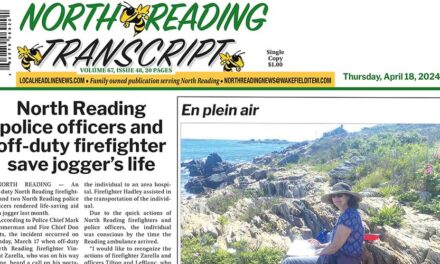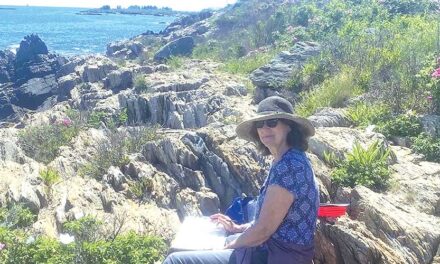By MAUREEN DOHERTY
NORTH READING — Four out of five Select Board members supported the acquisition of the 14-acre Seven Acres Poultry Farm at 14 Concord St. and will recommend in favor of the passage of Article 1 at Saturday’s Special Town Meeting.
The majority opinion was offered during Monday night’s virtual Select Board hearing “attended” by dozens of townspeople in preparation for the Special Town Meeting slated to begin at 9 a.m. August 8 outdoors at Arthur J. Kenney Field. At the meeting, all chairs will be set up throughout the field to maintain at least six feet of physical distance between chairs arranged individually or small groups for household units. Participants should wear or bring their masks.
Under the special legislative rules enacted under the governor’s state of emergency due to the COVID-19, the quorum for this Special Town Meeting has been reduced to 15 voters (10% of the quorum). The 120-day period for the right of first refusal would have expired in late May if it also had not been extended under the emergency orders.
Article 1 would pay for the land, which includes the three barns and 114-feet of frontage on Concord Street, for $1,120,000. (The additional $20,000 covers the estimated cost for demolition of the barns.) The town has the right of first refusal for the purchase of the farmland under Chapter 61A, the state law that provides tax exemptions for maintaining the agricultural exemption. However, once the landowner puts the land up for sale with the intent of not maintaining that exemption, the town can match the bona fide purchase and sales agreement. The town cannot re-negotiate that sale price.
According to Town Administrator Michael Gilleberto, the last known sale price of the 14 acres at the 14 Concord Street farm was $270,000 and the current assessed valuation of the property is $97,500, which breaks down to $94,100 for the three buildings (barns) and $3,400 for the land. This reduction in land value is based on the restriction for agricultural use under Ch. 61A.
“I am in favor of the town purchasing the property. It is a keystone (location) for the development of Concord Street and the town has an opportunity to step into a private deal with a pre-set price at market price rather than having to engage in any activities such as eminent domain and having the price settled later on, generally at a higher price,” explained Select Board member Stephen O’Leary.
“The location of the property is critical when it comes to development, or whether it be open space or affordable housing, a future Town Meeting will decide what the value of the property is going to be,” O’Leary said.
“We have the resources currently from the sale of the J.T. Berry Property for the acquisition of this (to) retain it as an asset and should Town Meeting and the board decide later on to sell the asset or retain it for open space or any other purpose, it provides an opportunity that we wouldn’t normally have,” O’Leary added.
“I believe I will be the sole Select Board member who is not in favor of pursuing this property simply because we have other priorities in town to be considered. I will explain this more on Saturday,” Select Board member Rich Wallner said.
“We have $20M that we have sitting in the bank and we would be taking away $1M or $2M for this purpose (which) takes away our ability to achieve other goals that we have in town that many other committees are working toward and striving for,” Wallner added.
Given its size, location and the town’s long-term strategic goals, Select Board member Vincenzo Stuto said regardless of whether the town currently has a specific purpose in mind for the property he would prefer that “the town acquire it for many different purposes rather than regret the opportunity to acquire it. I have noticed if you look at the past there have been a lot of things where people have said ‘I wish we did this five or 10 years ago; it ended up costing the town a lot more money,’ and I think this could be one of those (opportunities).”
Select Board Vice Chairwoman Liane Gonzalez said she favors the town buying the property mainly so “we can be in control of it. I think it is important for us to decide what happens there rather than let it go and have somebody else decide what goes there.”
Select Board Chairwoman Kate Manupelli agreed. “I have been in favor of it since the beginning for the preservation of open space,” she said, adding that she is also open to “the potential that this (property) could have for development down the line.”
3-2 in favor of Art. 2
Article 2 asks voters to authorize the town to potentially purchase two adjacent residential parcels, each 0.92 acres and both with residential homes — a single-family farmhouse with a market attached at 4 Concord St. and a two-family home with a large V-shaped barn at 12 Concord St. Each would be sold for $450,000 and the combined frontage of these two properties plus 14 Concord St. would be about 500 feet.
These properties are held in common ownership by the sellers, the Magliozzi family, who have entered into a purchase and sales agreement with Concord Street Realty Trust. This P&S agreement makes the sale of 14 Concord St. contingent upon the purchase of 12 Concord St. (the two-family). It also requires the seller to offer the buyer 4 Concord St. if he chooses to sell the single-family home in the next three years.
Therefore, even though the town does not have the right of first refusal to purchase 4 and 12 Concord St., the terms of the agreement between the seller and the private buyer had to be revealed to the town. As Gilleberto pointed out in his PowerPoint presentation, “The town does not have an option to purchase these properties at this time, but based on the wording of the agreements in place with the buyer, the properties may be available to the town if the town purchases 14 Concord St. Accordingly, the Select Board is seeking authority to potentially pursue acquiring these properties based on the conditions outlined in the agreements between the owner and the buyer.”
Article 2 garnered a majority 3-2 recommendation from the Select Board, with O’Leary, Gonzalez and Stuto in favor and Wallner and Manupelli opposed.
Public comment
Jeff Gannon, 3 Linwood Avenue praised the presentation and environmental studies done by the town. “The presentation was good. It is nice to hear about the testing and study although they were numbers only. I think it would be a mistake to spend the money and not do anything (with it). We have great open space here. Part of the lot could be used for open space, but if the town were to purchase it I would hope that there would be a lot of support for doing something there. I think if the Select Board, Planning Commission and others could really see something here it is definitely worth purchasing this size of property for the price it appears we can get it at.”
An architect by trade, Gannon sees the RFP process as “an opportunity for the town to be able to decide what they want there … You can look to avoid certain conflicts, at Elm Street, for example, when you are in control of it. I think there needs to be good intent if it is purchased.”
“I live fairly close to the Ipswich River and I have been watching the Ipswich River Watershed committee and the activities of the river,” commented Donald Putney, 20 Riverside Drive. Putney believes it is the town’s responsibility to protect its downstream neighbors because the Ipswich is “the third most endangered river in the country, according to their statistics… we are so far up the river everything we do affects those communities down the river.”
This amounts to “more than 100,000 people,” Putney said, “And based on that, I would applaud the members of the Select Board that say ‘let’s buy it and see what we need to do with it.’ I am very much in favor of that.”
Paul Denaro of 402 Park St. said he is a direct abutter to the east of the farm. “I think the town should have a firm reason to purchase it because… I want to know what it is to be used for rather than just buy (it as) open property or senior housing units or individual property, since I am so close to it. It would certainly impact me.”
Manupelli explained, “If the town does not move forward and acquire this parcel, any individual who does acquire it has a number of development options available either under zoning or by seeking permitting from our permitting boards.”
The private buyer, Sergio Coviello, had stated at a prior public meeting that he would like to relocate his electrical business here. He declined an offer to present his plan again during the virtual meeting but will have the opportunity to do so at town meeting. However, since the entire property is zoned residential, a commercial use would require a zoning change by Town Meeting.
By right, the property would support seven house lots on paper, but due to wetlands, Gilleberto said the town believes it would be closer to five homes.
Another suggestion has been senior housing, which Gilleberto said the land may be able to support up to 80 one- and two-bedroom units “provided the septic design did not exceed 10,000 gallons per day.”
Having some land so close to the commercial zone when sewerage is proposed could also be beneficial to the town’s interests, O’Leary suggested.
Since the town does not have 10 percent of its housing stock, any owner could propose the land be developed under a Ch. 40B plan which allows for higher density by overriding local zoning in exchange for a percentage of units being made available to low to moderate income buyers or renters.
“We have not made a definitive plan with regard to the use of it. The opportunity to acquire it is only available to us for a limited window of time and that is why we are moving forward,” Manupelli explained. “I don’t think we can answer your question, Mr. Denaro, on what the use is this evening because that has not been determined. What we can indicate is at least a majority of us are in favor of acquisition of it because of its potential for development or other use in the town.”





